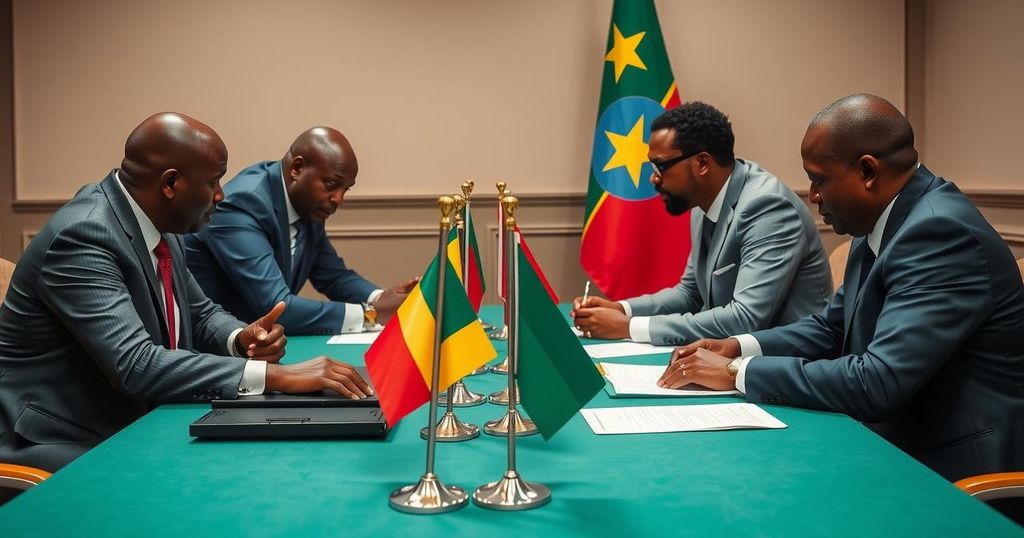Global news
AFRICA, AFRICAN UNION, AFRICAN UNION COMMISSION, ANKARA, AU, DIPLOMACY, EAST AFRICA, EUROPE/ASIA, HASSAN SHEIKH MOHAMUD, INTERGOVERNMENTAL AUTHORITY ON DEVELOPMENT, INTERNATIONAL RELATIONS, MOHAMUD, MOUSSA FAKI MAHAMAT, REC, REGIONAL COOPERATION, SOMALIA, SOMALILAND, TURKEY, WORKNEH GEBEYEHU
Marcus Li
0 Comments
AU Calls for Immediate Implementation of Ethiopia-Somalia Agreement
The African Union has urged Somalia and Ethiopia to swiftly implement an agreement aimed at easing tensions related to Ethiopia’s access to the sea. Following Turkish-brokered talks, both countries agreed to collaborate on ensuring this access while respecting Somalia’s sovereignty. Although the agreement has been welcomed by regional and international leaders, uncertainties regarding previous agreements with Somaliland persist, highlighting ongoing challenges in East African diplomacy.
The African Union has called upon Ethiopia and Somalia to swiftly execute an agreement designed to alleviate tensions regarding Ethiopia’s access to the sea. This plea follows a recent accord following Turkish-mediated discussions in Ankara, which aimed to resolve long-standing disputes. Ethiopia and Somalia have been at odds since Ethiopia secured a deal with Somaliland to lease a segment of coastline. Somaliland has aimed to gain formal recognition from Ethiopia in exchange for the lease, a move that has been met with opposition from the Somali government, which considers it a breach of its sovereignty.
Turkish President Recep Tayyip Erdogan described the agreement as a pivotal step towards fostering cooperation and reiterated the necessity for Ethiopia’s coastline access. Both countries plan to initiate technical discussions by February to ensure Ethiopia’s reliable maritime access whilst firmly maintaining Somalia’s sovereign authority. The East African regional bloc IGAD has praised the agreement as a significant move toward amicably resolving bilateral matters.
Moreover, notable figures such as U.S. Secretary of State Antony Blinken and UN Secretary-General Antonio Guterres have expressed optimism regarding the negotiations, highlighting the reaffirmation of each nation’s sovereignty. Despite these advancements, uncertainties linger regarding the implications of the prior memorandum of understanding between Ethiopia and Somaliland. In light of Ethiopia’s historical lack of coastal access since Eritrea’s independence in 1993, this agreement offers a potential pathway towards stability in the region while Somalia seeks to bolster its alliances with Egypt amid ongoing tensions with Ethiopia.
Ethiopia’s desire for maritime access has historically been a point of contention since it became landlocked following Eritrea’s independence in 1993. The establishment of a deal with Somaliland, a self-declared independent region, raised alarms regarding Somalia’s sovereignty, igniting fears of renewed conflict in East Africa. The African Union’s involvement signifies the urgency for both nations to address their differences and find a diplomatic resolution, as regional stability remains paramount. The recent agreement brokered in Ankara underscores a commitment to cooperative relations, with both nations recognizing shared interests.
In conclusion, the African Union’s insistence on prompt implementation of the agreement signifies a critical moment for Ethiopia and Somalia as they seek to mitigate tensions. The deal represents a collaborative effort to address historical grievances while ensuring Ethiopia’s access to the sea. Global stakeholders, including the United Nations and the United States, remain optimistic for a positive outcome as both nations embark on technical discussions, further emphasizing the importance of regional stability and mutual cooperation.
Original Source: www.jacarandafm.com




Post Comment